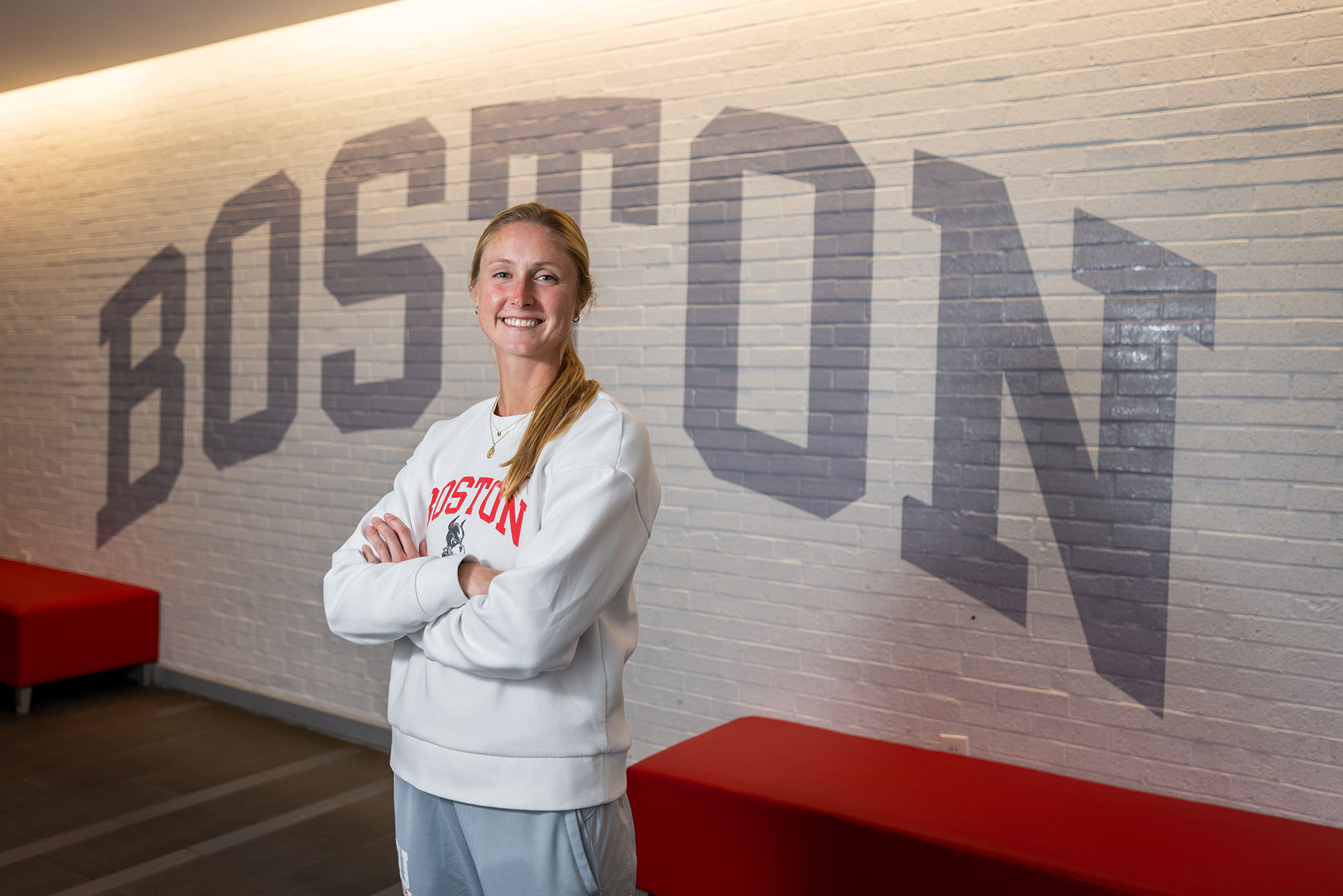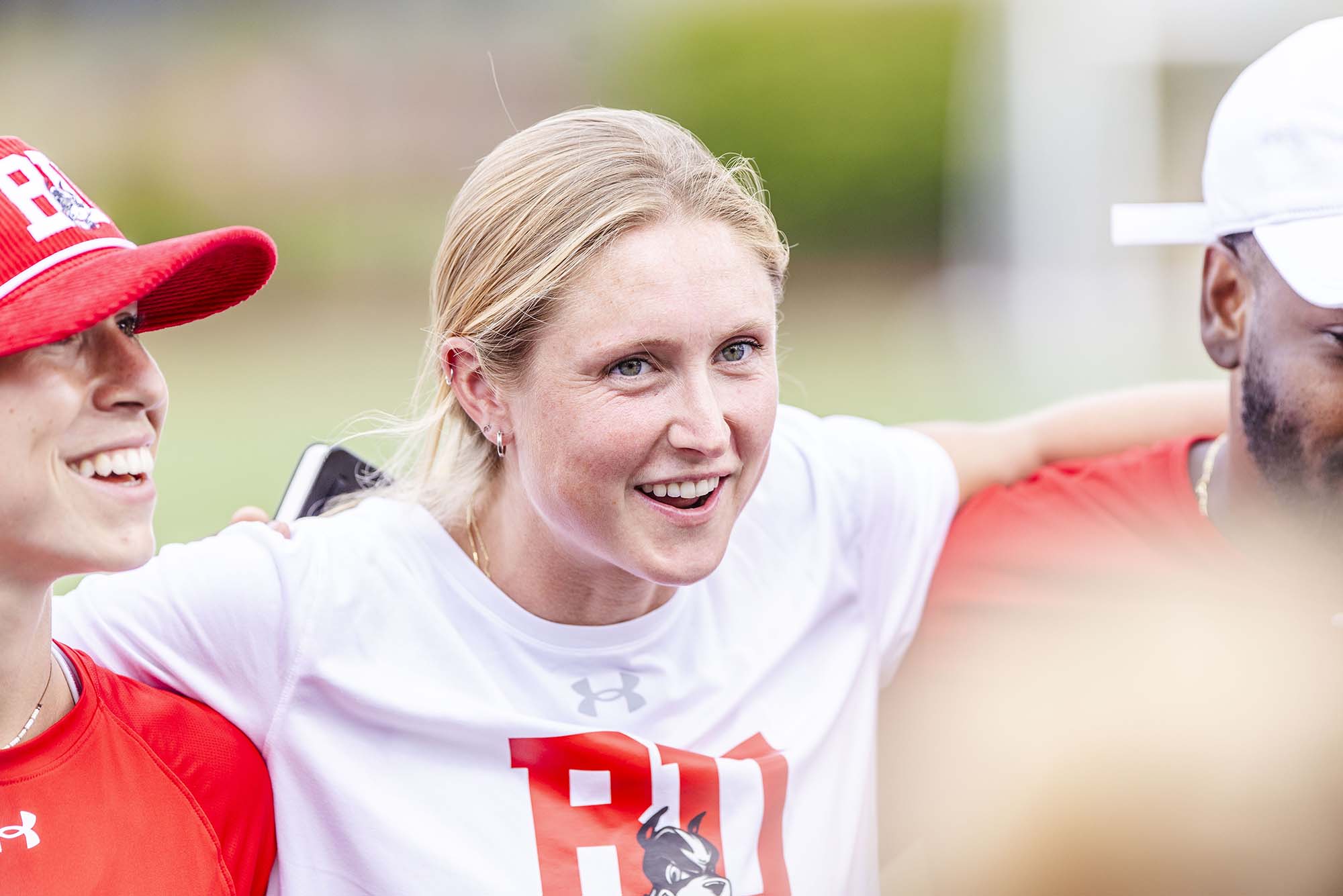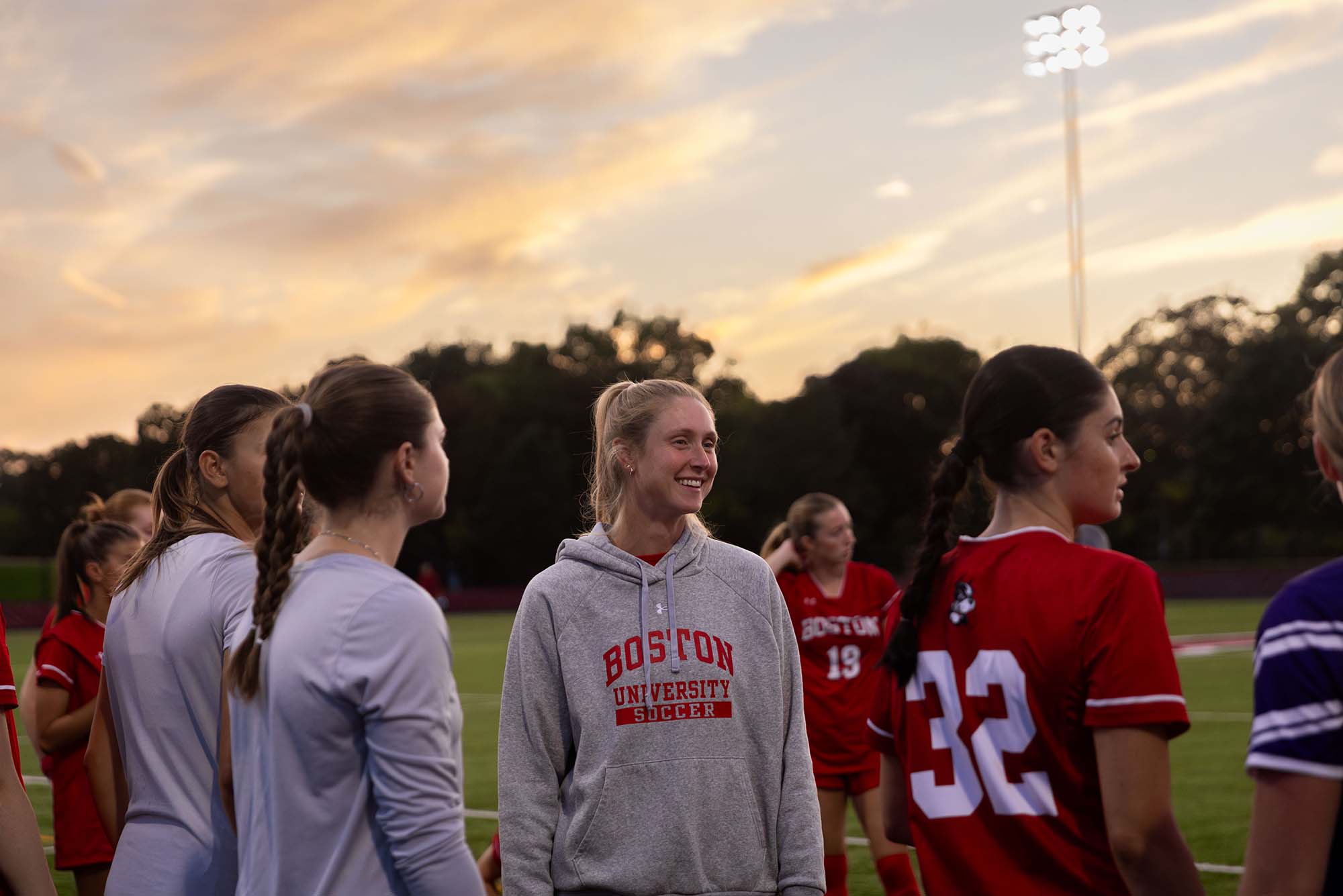Megan Burke Never Planned to Coach—Now She’s Shaping the Future of BU Women’s Soccer

“It’s everything I always dreamed of once I started coaching,” the head coach of BU women’s soccer, Megan Burke, says.
Megan Burke Never Planned to Coach—Now She’s Shaping the Future of BU Women’s Soccer
Terriers head coach has built her career on calm confidence, fierce competitiveness, and genuine care for her players
Megan Burke never planned to coach. As a kinesiology major at the University of Massachusetts Amherst, she figured her career path would lead to athletic training or physical therapy. “I was always the kid growing up that did what she was told,” Burke says. “I thought that was my next step.”
So how did she wind up as the head coach of the BU women’s soccer team? It goes back to when Burke had a moment of realization. She had accepted that she didn’t want to go into kinesiology. As a senior on the UMass women’s soccer team in 2016, she was asked if she had ever considered coaching, which opened her eyes to the idea of becoming a graduate assistant at a Division I program.
Her head coach at the time, Ed Matz, sent out a mass email to programs around the country on her behalf. New Mexico State University called, Burke answered, and her coaching journey began.
“I was dropped off in the middle of Las Cruces, New Mexico, and it was like, ‘Good luck,’” she says. “I had never met my boss in person. I never met the other assistants. I’d never met the team. I went from being an East Coaster—more specifically, a New Englander—my whole life, to going to the desert.”
Stepping up
One of the first things Burke learned after taking on coaching was that every coach has his or her own approach. She’d seen the game only through a player’s eyes, now she had to learn to teach from a coach’s perspective. What was surprising to her was everything a coach does behind-the-scenes, whether it’s travel logistics or food for team meals. The experience “was a great foot in the door,” she says.
Her time in the desert resulted in her being hired as an assistant coach in 2019 at Fairfield University in Connecticut, close to her hometown of Shelton. She felt more comfortable at Fairfield, and acknowledges it was a step up in her coaching career.
“To be a part of a rebuild and really see how a coach can do that and affect culture was probably the biggest takeaway,” she says.
In 2022, Burke joined BU as an assistant coach, and in 2024 she helped lead the Terriers to a Patriot League championship. In January, she was named the third head coach in program history.
It was “everything I always dreamed of once I started coaching,” Burke says. “It meant the world. It’s obviously a huge step in my career, and I’ve just been learning so much.”
She hired two people she knew and trusted to be her assistants: Marcus Carrington and Amy Thompson (CAS’22, Wheelock’25). Burke had coached with Carrington at Fairfield and coached Thompson as a fifth-year in Burke’s first season as an assistant at BU.

From the second she met Burke, Thompson says, she was struck by how “everyone just loves Meg. She’s just such a personable person, great coach, and just a great person.”
Burke arrived on Comm Ave at the same time as players Giulianna Gianino (Sargent’26) and Margy Porta (Questrom’26). Gianino still vividly remembers her first impression of Burke. And Porta says Burke made their transition to college easy, since the coach had been a player not long before.
“It’s been fun just watching her confidence grow and her competitive nature grow,” Porta says.
Calm, cool—competitive
Asked how she thinks her team would describe her, Burke has two answers. “I had someone tell me that I was chill the other day,” she says, with a chuckle. “They’d also say I’m competitive.”
Her competitiveness stretches both in and outside of soccer. She hates losing, Carrington says, and she’s never complacent, even when the Terriers are winning.
Off the pitch, Burke and Thompson are in the same WHOOP group—a health and fitness tracker that allows you to see leaderboards on strain, recovery, and sleep and compare data with others. Thompson says the two compare each other’s strains, which quantifies the physical and mental stress on one’s body.

“She pushes me,” Thompson says. “If I go on a run, she’s competitive, then she’s got to go run or go lift. So even off the field, we’re always pushing ourselves to be better.”
From the perspective of her players, Burke’s competitiveness shows in how the Terriers play. Gianino describes their style of play as “more attacking and tactical.” Porta agrees, but adds that the way they practice emulates the way they play.
Their coach wants her players to be solving problems for themselves on the fly. It all comes down to preparation, she says. She describes herself as type A, and she likes to prepare her team for any possible situation that could arise. She’s calm, cool, and collected in the heat of competition.
“I’m rarely yelling, screaming, trying to engage the players, because as a player I know that rattled me,” Burke says. “And I know that emotions carry—if I’m screaming and uptight and anxious, it’s gonna wear off on them. They’re not gonna play as free and smooth as they usually would.”
A lasting effect
At the end of the day, Burke hopes to have a lasting effect on her players. She wants them to leave BU better than when they arrived—not just as athletes, but as people.
“I think about that every single day,” she says. “I want them to leave just thinking, she cared so much about me and did everything that she could to give us such an awesome experience here.”
That is her favorite thing about coaching: “The relationships you build throughout it.”